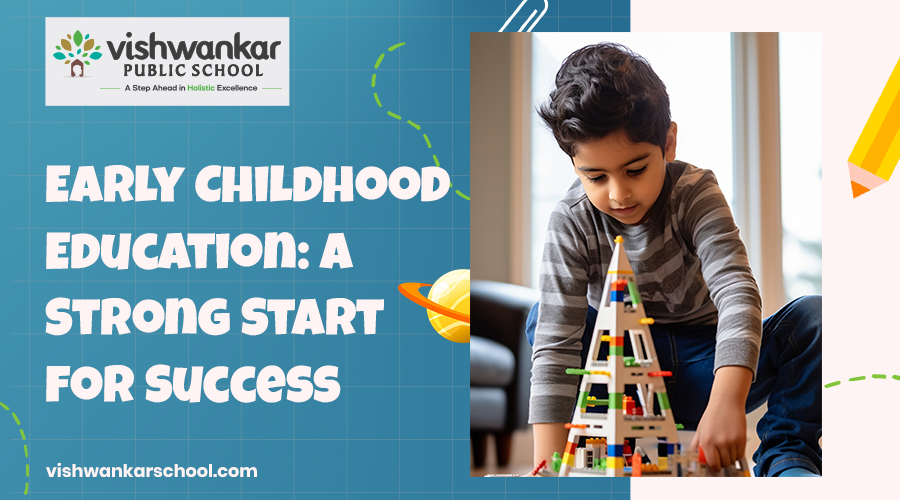The Importance of Early Childhood Education: A Foundation for Lifelong Success

Have you ever sat and watched a child learn something new for the very first time? It’s pure magic. Whether it’s recognizing colours, singing a nursery rhyme, or tying their shoelaces, these little achievements are stepping stones to a much larger journey, and it all starts with early childhood education.
In today’s fast-paced world, it is natural to believe that academic pressure begins only in senior classes. However, in life, the importance of early childhood education cannot be overlooked. It is not only about learning ABCs or 123s, it is about developing curious minds, kind hearts, and confident little humans.
Let’s take a closer look at why investing in early education is one of the smartest choices parents and guardians can make.
Why the Importance of Early Childhood Education Is More Relevant Than Ever
If you’re a parent or guardian, you’ve probably wondered when is the right time to start your child’s education. The answer? Earlier than you think. The importance of early childhood education lies in its power to build the foundation for lifelong learning, social skills, and emotional resilience.
A child’s brain develops more throughout the first five years of life than during any other period. This indicates that their surroundings, encounters, and relationships during this stage have a big influence on their development. That is exactly what a loving and learning environment can offer to your child.
1. Develops Social and Emotional Skills
Kids aren’t just being taught numbers and letters in early childhood classes. They’re learning to share, become friends, communicate their emotions, and be empathetic. These benefits of early childhood learning are incredibly important in preparing children for the great big world.
They learn to work together as a team, understand instructions, and handle conflicts peacefully. These sessions help children develop confidence and self-reliance, traits that remain with them life-long.
2. Promotes Language and Cognitive Development
Have you ever observed how quickly young children pick up new vocabulary? It’s not a coincidence. Early education taps into this natural ability by encouraging storytelling, reading, singing, and communication.
Now you must be thinking, what is early childhood care and education? Young people’s communication abilities should be developed, and engaging activities should be used to keep their minds engaged. Children who receive this kind of instruction benefit from improved memory, concentration, and problem-solving skills all of which are essential for success in both school and in life.
3. Nurtures Curiosity and Creativity
Young children are curious. From playing with Legos to asking “why” a million times, they’re always questioning. An excellent early education setting understands this and provides them with the means to communicate.
Whether it’s through painting, music, make-believe play, or just play experiments, such activities aid in brain development and also make learning enjoyable. That’s why ‘why ECCE is important’ is something every parent needs to research when planning for their child’s future
4. Lays the Groundwork for Academic Success
Here’s the truth: Children who attend quality early learning programs often perform better academically in later years. They’re more likely to read at grade level, have better math skills, and show improved focus and classroom behaviour.
It’s because early education doesn’t just teach facts it teaches how to learn. That’s the real power behind the importance of ECCE (Early Childhood Care and Education).
5. Supports Physical Development
Indeed, physical development is just as important as cerebral and emotional development. Through activities like running, climbing, drawing, and dancing, kids develop both fine and gross motor skills.
In order to help kids keep active while building strength, balance, and coordination in a secure, supervised environment, early education centres frequently include guided playtime and exercise.
Also read: https://vishwankarschool.com/importance-of-physical-education-in-schools/
6. Encourages Positive Parenting
Early childhood education doesn’t just help kids – it supports parents too. Caregivers are often encouraged to participate in classroom activities, parent-teacher meetings, and workshops. This creates a support system and helps parents understand how their child is progressing.
Wondering what is the full form of ECCE? It is Early Childhood Care and Education, and it cares for more than just the child. It’s a family effort.
7. Establishes Habits of Lifelong Learning
Early habits are more likely to stay. These behaviours, such as asking questions, being curious, and arriving on time, are frequently taught in early childhood settings. Children get a positive attitude toward education that lasts for many years.
That’s why the importance of early childhood care and education is more than a catchphrase, it is a long-term investment in your child’s future.
Wrapping It Up
Choosing the right preschool for your child isn’t about chasing academic milestones. It’s about creating a sound, confident, and emotionally smart person from scratch.
If you are a parent or guardian, now’s the time to look for alternatives around you, particularly if you reside in an expanding city with high-quality play school in Coimbatore and such institutions.
Keep in mind that those initial years are just the beginning. They serve as the cornerstone of a bright, successful future. One early lesson at a time, let’s raise the next generation to be intelligent, kind, and prepared for the world.dly school environments and active play opportunities, check out Primary schools in Coimbatore that integrate fun with learning.

